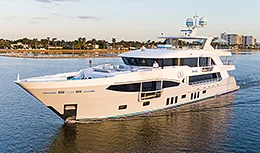- Alaskan Yachts
- Azimut Yachts
- Back Cove Yachts
- Beneteau Yachts
- Benetti Superyachts
- Bertram Yachts
- Boston Whaler
- Broward Yachts
- Buddy Davis Sportfish
- Burger Yachts
- Cabo Yachts
- Catamarans
- Carver Motoryachts
- Center Console
- Chris-Craft Yachts
- Cruisers Yachts
- DeFever Trawlers
- Dufour Sailboats
- Fairline Yachts
- Feadship Yachts
- Ferretti Yachts
- Formula Yachts
- Fountaine Pajot Cats
- Grady-White
- Grand Banks Trawlers
- Hargrave Yachts
- Hatteras Yachts
- Hinckley Picnic Boats
- Horizon Yachts
- Hydra-Sports
- Intrepid Boats
- Jarrett Bay Sportfish
- Jeanneau Yachts
- Kadey-Krogen Trawlers
- Lazzara Yachts
- Lekker Boats
- Luhrs Sportfish
- Marlow Yachts
- Maritimo Yachts
- Marquis Yachts
- McKinna Motoryachts
- Meridian Yachts
- Midnight Express
- MJM Yachts
- Mochi Craft
- Neptunus Motoryachts
- Nordhavn Trawlers
- Nordic Tugs
- Numarine Yachts
- Ocean Alexander Yachts
- Offshore Yachts
- Outer Reef
- Oyster Sailing Yachts
- Pacific Mariner Yachts
- Palmer Johnson Yachts
What You Need To Know About Sales Tax Assessment + Buying A Boat
A Maritime Lawyer breaks down a question about sales tax and buying a boat.
This article originally appears in Sea Magazine, written by David Weil.
Question: I am in the market for a motor yacht in the 50-foot range and would like some information regarding the assessment of sales tax on my purchase. My broker suggested I should form an LLC to buy the boat, since a purchase by an LLC would be tax-exempt. Is this accurate? I would be looking at a significant tax bill on this purchase, so I want to know what to expect before I make my offer.

Answer: The simple answer to our reader’s question is a resounding “NO.” An LLC is a taxpayer like anyone else, and it is not automatically exempt from the assessment of sales or use tax on the purchase of a boat. But let’s look at this in more detail.
Our reader, like many people in the market for a boat, is concerned about the assessment of sales tax or use tax on his purchase (sales tax is assessed on the purchase of a new boat from a dealer, and use tax is assessed at the same rate on a used boat). The exact assessment varies from county to county, but the rate in California is now generally close to ten percent. That will add up to a significant tax bill regardless of the purchase price, and as such the yachting community has always looked for strategies to avoid that expense.
Sales tax law varies from state to state. California will assess sales or use tax if the boat is (1) purchased in California OR (2) purchased for “use” in California. California’s territorial boundary extends three miles into the ocean, so if the purchase can be structured to close more than three miles offshore (an “Offshore Delivery”), the buyer will satisfy the first prong of the test. The second prong involves a subjective analysis of the buyer’s intended use at the time of the purchase, which is a little more complicated. A calendar test was devised, and if the boat is kept outside of California for a period of time after the purchase it may be exempt from the tax.

Many of our readers will remember the “good old days,” when a buyer could avoid the assessment of sales or use tax by keeping the boat out of state for 90 days after the purchase. That all changed in 2008 when the test was increased to one year for California residents and six months for non-residents. This led to a significant reduction in “Offshore Delivery” transactions and a need to find some other way to avoid sales tax on a boat purchase. An LLC may provide that relief, but not in the way that our reader suggested. Simply put, the LLC must already own the boat before the buyer submits his or her offer, and the offer must be for the purchase of the LLC rather than the boat.
Where a yacht is owned by a corporation or LLC, the stock of the company may be transferred without affecting the ownership of the boat itself. The stock transfer amounts to a transfer of intangible personal property, even where the sole asset of the company is the yacht, and as such, the transaction will usually be exempt from sales and use tax without the need to spend any time with the boat outside of the state.
Notwithstanding the apparent simplicity of this approach for tax purposes, a stock purchase will raise all sorts of other concerns. Most importantly, the purchase of a company will include the acquisition of all of that company’s liabilities, even where those obligations are completely unrelated to the boat, and even where the buyer has no notice of the liabilities.

Perhaps the most important risk of unrecorded or undisclosed liabilities will relate to the company’s acquisition of the boat. As noted above, just like the rest of us, a company must either pay the tax or qualify for an “offshore delivery” or other exemption. In these circumstances, the company itself is the taxpayer, and a buyer who is interested in acquiring a boat through an LLC purchase must confirm that the LLC’s tax liability was satisfied.
Other tax liabilities may be equally problematic. Corporations and LLC’s are required annually to file various forms and pay fees to the state in which they are registered. Failure to do so may subject the new owner to a charge for penalties in addition to unpaid fees. Similarly, if the company has a bank account in its name the IRS may look at whether any interest income was earned on the account.
A buyer of a boat through an LLC acquisition must also consider the language of the purchase contract. Yacht brokers are experienced with contracts used for the sale of a yacht, and the forms sponsored by the California Yacht Brokers Association are in fact very well drafted. But as noted above, the yacht itself is not being sold when the stock or membership of a company is transferred. The parties must therefore use a contract drafted specifically for the transfer of corporate stock or interest in an LLC.

A boat that is owned by a corporation or LLC may provide a strategy for avoiding sales or use tax on a boat purchase, but the “baggage” associated with such a purchase may lead to more headaches for the buyer after the purchase. This type of transaction requires competent legal advice, and with all due respect to my friends in the brokerage industry, a yacht broker is neither licensed nor qualified to guide the parties through the purchase and sale of a business entity. Contact an attorney who is experienced in this type of transaction.
David Weil is licensed to practice law in the state of California and as such, some of the information provided in this column may not be applicable in a jurisdiction outside of California. Please note also that no two legal situations are alike, and it is impossible to provide accurate legal advice without knowing all the facts of a particular situation. Therefore, the information provided in this column should not be regarded as individual legal advice, and readers should not act upon this information without seeking the opinion of an attorney in their home state. David Weil is the managing attorney at Weil & Associates (www.weilmaritime.com) in Seal Beach. He is an adjunct professor of Admiralty Law, a member of the Maritime Law Association of the United States and is former legal counsel to the California Yacht Brokers Association. If you have a maritime law question for Weil, he can be contacted at 562-799-5508, through his website at www.weilmaritime.com, or via email at dweil@weilmaritime.com.






